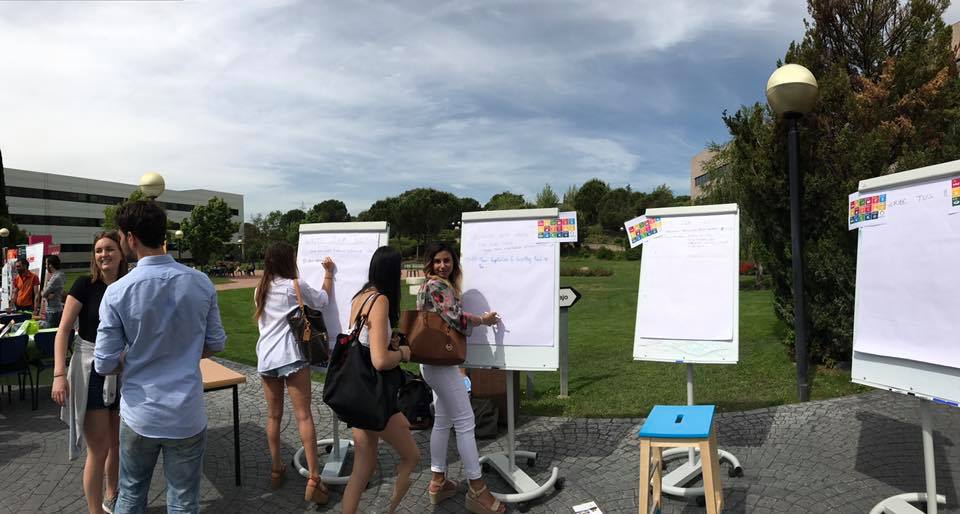Universidad Europea, we can Improve!

Universidad Europea has improved its commitment to being a sustainable, fair and responsible institution. Though we in the International Relations Club (IRClub) believe everything can always be improved.
The 17th of May, 2017, Universidad Europea arranged a event to spread awareness about the 17 United Nations Sustainable Development Goals (SDG) where we in the IRClub were asked to contribute with a workshop. We decided this would be a perfect opportunity to gather some insight on how Universidad Europea can improve its sustainability on campus. We therefore welcomed students to come by our stand to contribute with suggestions to how students, faculty and the administration of our university can improve. This article will be an attempt to capture the essence of the suggestions brought to us. We seek to inspire the univeristy in which we hold dear to push the limits of what is expected, and become a source of inspiration to other institutions in Spain and Europe.
Many students suggested to start using renewable energy at our campuses, like solar panels on the roofs This can relate to goals 7 (renewable energy), 9 (Innovation and Infrastructure) and 13 (Climate action). This is of course one of the initiatives which would be more costly from a short-term perspective, but as our campus covers a massive area there is great potential to win back such an investment in saved energy consumption costs.
There were also many that suggested that the cafeterias should provide more vegetarian alternatives. This one would fall under goal 12 (Responsible Consumption) and 15 (Life on Land) as the meat industry is perhaps one of the most land consuming and polluting industries in the world. The meat industry also overuse antibiotics when feeding the animals, which we can relate to goal number 3 (good health) as overconsumption of antibiotics contributes to the development of antibiotic resistant bacteria. Providing alternative vegetarian meals to a competitive price, and promoting these meals as helpful to a sustainable future could be a great initiative.
Waste, in all its forms was also a popular topic. Many students had suggestions for improving recycling, waste and consumption. First with regard to recycling. Although the university offers a variety of ways to recycle everything from plastic and paper to batteries and phones, the first two aren’t that well overseen. Many people commented that the color coding isn’t sufficient, and that few people respect them. As one walks past the recycling bins, one can see that paper coffee mugs for instance, are thrown together with their plastic tops. There were many suggestions on how to improve this. Several students and professors were calling for greater encouragement and education about the university’s recycling system, and the consequences of not following up on it.
Another comment on waste was with regard to one’s use of cups for either coffee, tea or water, and bottled water in general. In this case it was suggested that the school can offer or sell reusable coffee mugs to use in the cantina and reusable water bottles as well. We suggest that these could be sold at cost in order to give the cheapest price possible so that people would be motivated to buy them. (Waste management, can be seen as contributions to goals 12, sustainable consumptions, and 14, 15 which covers life on land and below water.)
Several ideas relating to the community at UE was also presented. For instance, many students and professors alike expressed the need for more female speakers in events and conferences at the university. (gender equality, 5) Students also expressed interest in stronger cooperation with NGOs, non-profits, etc. Any expressed the delight of having an event like this one, and that it could be interesting to see more of them in the future. (Partnership for the goals, 17)
A final suggestion was that our suppliers, and other companies on campus like Sodexo, should be encouraged to minimize food and plastic waste as much as possible. Simple solutions like donating leftover food to charitable organizations (No poverty, 2), or selling it at lower price in the mornings would contribute to more responsible consumption (12). Pushing towards more use of paper and wooden utensils, bags, covers etc., can also contribute to a more sustainable consumption.
As we see, there is much potential for improvements at Universidad Europea, and students, professors and staff see it. We in the IRClub hope to see a continuous effort towards becoming a more sustainable institution.
By the IRClub


